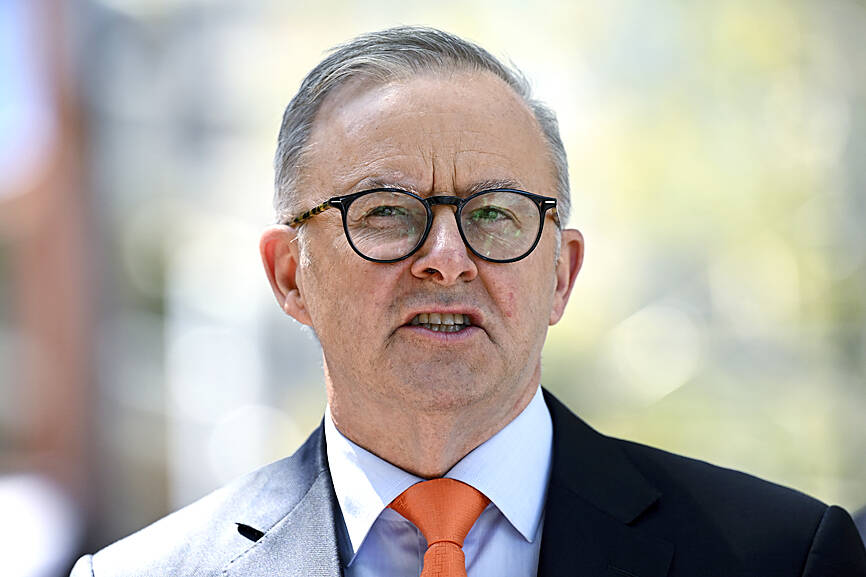Australian Prime Minister Anthony Albanese yesterday said he would ask Chinese President Xi Jinping (習近平) to lift billions of dollars in trade barriers if the two leaders hold their first bilateral meeting this month.
Albanese was speaking in Sydney before departing Australia yesterday for the East Asia Summit in Cambodia, followed by a G20 meeting in Indonesia, then an APEC forum meeting in Thailand.
A face-to-face meeting between the Chinese and Australian leaders would mark a major reset in a bilateral relationship that plumbed new depths under the nine-year rule of Australia’s previous conservative government.

Photo: AP
Beijing had banned minister-to-minister contacts and imposed a series of official and unofficial trade barriers on products including wine, coal, beef, seafood and barley in recent years, which cost Australian exporters A$20 billion (US$13.28 billion) a year.
Albanese said a meeting with Xi was “not locked in at this point in time.”
However, China lifting economic sanctions would be the first priority in returning to normal relations, he said.
“We have some A$20 billion of economic sanctions against Australia. That is not in Australia’s interest in terms of our jobs and the economy, but it’s also not in China’s interest.” Albanese said.
“Australia has world class products — in seafood, in meat, in wine, in other products that we export to China. It’s in China’s interest to receive those products, it’s in Australia’s interest to export them. So I’m very hopeful. We’ll continue to put our case that these sanctions are not justified, that they need to be removed,” Albanese added.
Asked what China wanted from Australia to improve relations, Albanese said: “It’s not up to me to put forward their case.”
“What I want to see with the relationship with China is cooperation where we ... maintain our Australian values where we must,” Albanese said.
Bilateral relations soured over issues including Australian demands for an independent inquiry into the COVID-19 pandemic, a ban on Chinese telecommunications giant Huawei’s involvement in the Australian 5G networks on security grounds and recent laws that ban covert foreign interference in domestic politics.
Chinese Ambassador to Australia Xiao Qian (肖千) said in August that Beijing would discuss with Australia whether conditions were right in November for Albanese to meet Xi during the G20 summit. Xi is not expected to attend the East Asia Summit.
China’s People’s Daily reported this week that “signs of resetting bilateral ties have emerged” since Albanese’s center-left Labor Party came to power in May.
The White House has confirmed that US President Joe Biden plans to hold talks with Xi on Monday on the sidelines of the G20 summit in Indonesia, their first face-to-face meeting since Biden became president in January last year.
The meeting would come as competition for influence among South Pacific island nations heightens between China and the US, along with allies including Australia. Beijing in June struck a security pact with the Solomon Islands that has raised fears of a Chinese naval base being established in the region.
Albanese said Australia has “strategic competition in the region” with China.
“China, of course, has changed its position, and it is much more forward-leaning than it was in the past,” Albanese said.
“That has caused tensions in the relationship, and we need to acknowledge that that’s the context in which the relationship exists,” he added.

VAGUE: The criteria of the amnesty remain unclear, but it would cover political violence from 1999 to today, and those convicted of murder or drug trafficking would not qualify Venezuelan Acting President Delcy Rodriguez on Friday announced an amnesty bill that could lead to the release of hundreds of prisoners, including opposition leaders, journalists and human rights activists detained for political reasons. The measure had long been sought by the US-backed opposition. It is the latest concession Rodriguez has made since taking the reins of the country on Jan. 3 after the brazen seizure of then-Venezuelan president Nicolas Maduro. Rodriguez told a gathering of justices, magistrates, ministers, military brass and other government leaders that the ruling party-controlled Venezuelan National Assembly would take up the bill with urgency. Rodriguez also announced the shutdown

Civil society leaders and members of a left-wing coalition yesterday filed impeachment complaints against Philippine Vice President Sara Duterte, restarting a process sidelined by the Supreme Court last year. Both cases accuse Duterte of misusing public funds during her term as education secretary, while one revives allegations that she threatened to assassinate former ally Philippine President Ferdinand Marcos Jr. The filings come on the same day that a committee in the House of Representatives was to begin hearings into impeachment complaints against Marcos, accused of corruption tied to a spiraling scandal over bogus flood control projects. Under the constitution, an impeachment by the

Exiled Tibetans began a unique global election yesterday for a government representing a homeland many have never seen, as part of a democratic exercise voters say carries great weight. From red-robed Buddhist monks in the snowy Himalayas, to political exiles in megacities across South Asia, to refugees in Australia, Europe and North America, voting takes place in 27 countries — but not China. “Elections ... show that the struggle for Tibet’s freedom and independence continues from generation to generation,” said candidate Gyaltsen Chokye, 33, who is based in the Indian hill-town of Dharamsala, headquarters of the government-in-exile, the Central Tibetan Administration (CTA). It

A Virginia man having an affair with the family’s Brazilian au pair on Monday was found guilty of murdering his wife and another man that prosecutors say was lured to the house as a fall guy. Brendan Banfield, a former Internal Revenue Service law enforcement officer, told police he came across Joseph Ryan attacking his wife, Christine Banfield, with a knife on the morning of Feb. 24, 2023. He shot Ryan and then Juliana Magalhaes, the au pair, shot him, too, but officials argued in court that the story was too good to be true, telling jurors that Brendan Banfield set